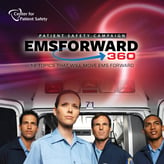EMS Forward
MISSION: Reducing preventable harm
HARM HAPPENS
It’s estimated between 250,000 and 440,000 patients in the U.S. die every year from medical errors. The wide margins are mostly due to not having a reliable way to measure all deaths that tie back to a medical error, so we must rely on estimates. The exact number is not as important as the people being harmed and dying of medical errors. In addition, the mental and physical harm to our emergency service providers is staggering, resulting in trained staff leaving the job, the industry, or even the workforce. Together, we can move EMS forward by improving provider safety and reducing preventable patient harm.
PATIENT AND PROVIDER SAFETY IS IMPACTED BY CULTURE
The links between organizational culture, patient and provider safety, and quality are nothing new, and many industries have generated highly reliable outcomes by addressing culture change.
“Culture,” in its simplest form, consists of the attitudes, beliefs, and perceptions of a collective group of people. It shapes employee behaviors, decisions, and choices and is, therefore, a complicated but highly influential component of the safety equation.
Individual agencies and services tend to develop their own, highly unique cultures as a result of different employee experiences, varying management styles, and diverse geographic locations. Unfortunately, negative cultural impacts can lead to a breakdown of the organization’s overall mission, vision, and values which can lead to medical errors. A strong organizational culture will not only improve provider and patient safety, but also support employee retention, save costs, and reduce turnover rates.
CPS believes organizations must make cultural changes to have a lasting impact.

EVERYTHING IMPACTS YOUR CULTURE OF SAFETY
Culture change is a transformative process and requires planning and direction. Your current processes, programs, policies, management styles, and more, currently impact your culture. While there is no checklist of tasks to ensure you achieve your cultural aspirations, consider the road signs on the map are points to explore more deeply.
Let the Center for Patient Safety help you identify where you are on the journey to organizational transformation.
A CULTURE OF SAFETY IS JUST AND ACCOUNTABLE
Patient and provider safety is important, but how can you establish a culture that encourages open reporting of adverse events and risky situations, yet holds people accountable in a just manner? The challenge lies in distinguishing between a system that might create risks (or human error) which may result in a bad outcome, and reckless behavior that intentionally puts lives or organizations at risk.
The Center for Patient Safety is able to customize education for your leaders and staff after a culture assessment that is specifically designed for your organization based on the results from your assessment.
ACCOUNTABILITY CAN BE SUPPORTED WITH A PSO
Expanding staff accountability should result in more conversations and improvement work around safety and quality issues within your organization. However, many states around the nation do not provide adequate confidentiality, or peer review protections, for EMS services and providers. A solution to overcome this barrier comes to you via participation with a Patient Safety Organization (PSO). As a PSO, the Center for Patient Safety offers federal-based confidentiality protection for your safety and quality improvement work.
“EMS agencies can become members of PSOs and not only achieve protection of their own processes but also benefit from the collective knowledge and understanding provided by the PSO and its members.”
– The National Association of Emergency Medical Technicians (NAEMT)
YOUR CULTURE OF SAFETY CAN BE MEASURED
A valuable component of improving culture is a tool to measure it.
The Center for Patient Safety has developed the only culture of safety survey specifically designed for First Responders with foundations from AHRQ's Surveys on Patient Safety™ which have been used worldwide in various settings for nearly two decades.
STAFF SUPPORT RETAINS EXPERTISE
Today's healthcare workforce is facing a multitude of challenges. Many adjust well to the demands encountered during a traumatic clinical event due to strong emotional defenses that carry them through and let them “get the job done.” Yet many times, the emotional aftershock (or stress reaction) can be difficult. Signs and symptoms of this emotional aftershock may last a few days, a few weeks, a few months, or longer.
Why EMS Chooses EMS Forward
Resources for EMS, Fire, and Air Medical to Assess, Measure and Improve
Since 2011, CPS was the first organization to engage Emergency Medical Services (EMS) in learning opportunities and strong patient safety practices. With custom programs and simplified implementation, EMS and pre-hospital care settings choose CPS to enhance and improve their existing programs on the journey to highly reliable care.
CPS has a unique ability to include safety culture work into various programs and can mine its contacts and vast safety event data for supportive information.
Through EMS Forward, CPS offers unique programs that fit your current needs and minimize program implementation time, so you can reach your goals more efficiently and cost-effectively.
What can we help you with today?
Together, we are better, stronger, and safer.
.png)






